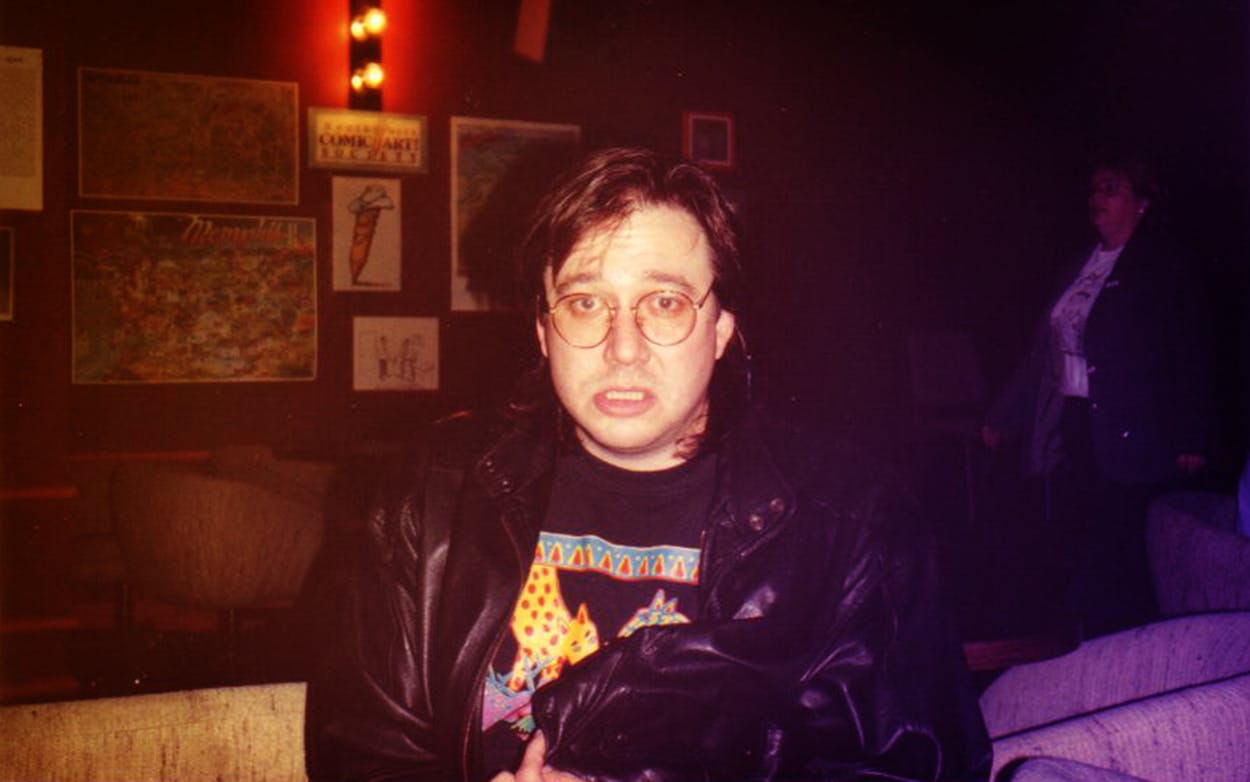Nearly 25 years after his death, the mythology of Bill Hicks looms much larger than the late comedian, who was born and raised in Houston and based in Austin, ever did during his lifetime. And his mythic stature seems likely to only grow in the years to come, now that his story will get the cinematic treatment from director Richard Linklater.
Hicks died in 1994 at the age of 33 from pancreatic cancer. His legend quickly spread: 1990s rock bands like Tool and Radiohead paid tribute to him shortly after his death, as the former sampled a performance he gave on its 1996 album Ænima and the latter dedicated its 1995 album The Bends to his memory. Other comedians, including Joe Rogan, David Cross, and Patton Oswalt, cited him as an inspiration. A late 1990s issue of the comic book Preacher (now the basis for the AMC show of the same name) turned his death into a major plot point for its protagonist, devoting four pages to a flashback of an encounter between the two.
Despite never achieving much in the way of fame or financial success during his lifetime, his death turned him into an icon, burnishing his legend as a Lenny Bruce-like truth-teller who used the power of comedy to challenge the status quo. (It also led to a particularly bizarre conspiracy theory that Hicks’s death was faked so he could be reborn as Alex Jones.)
Hicks has become part of the counterculture lexicon. The references on his records are dated—he goes after early 1990s teen heartthrob Joey Lawrence, one-hit wonder Rick Astley, and former country star Billy Ray Cyrus, now best known as Miley’s dad—but that hasn’t stopped every teenager with a passing interest in comedy from finding copies of his recordings in the rabbit hole of contemporary acts who revere him. One doesn’t need to remember when Debbie Gibson was a relevant cultural figure to listen to Hicks unleash one of his signature rants about the one-time pop star.
So it makes sense that his story is due for a biopic. (One was proposed in 2008, reportedly directed by and starring Russell Crowe, but never got off the ground.) And it makes sense that Linklater, who came of age in a religious Houston family at the same time that Hicks did, would be the one to tell it. Film and pop culture website Collider, which broke the news that Linklater had signed on to the project, quoted his gushing comments about Hicks in the 2010 documentary American: The Bill Hicks Story. “There’s not quite any others like him,” Linklater told the documentary crew. “They don’t speak in the same voice. You’d think people would take that torch and go with it, but it’s a rare combination of that kind of intelligence… Everything that’s going on in our culture, I always think, what would Bill Hicks be doing? You just miss him.”
People have been asking what Hicks would have to say about our current culture roughly since his death, and internet forums have been devoted to the question for decades. In 2006, Soft Skull Press published What Would Bill Hicks Say?, a collection of essays by famous fans and admirers who attempted to mimic his voice to produce Hicks-ian rants about events like the Iraq War and American Idol. Every few weeks, Reddit threads pop up arguing about whether Hicks, were he still alive, would be on the current political left or political right.
The answers to these questions tend to be much more about how the person who admired Hicks sees the world and how they’ve interpreted their own admiration than about the man himself, but they also speak to his legend. There aren’t ongoing debates about what John Belushi would say about the world we live in today, or how Sam Kinison might react to our current environment. Hicks occupies an outsized role, one in which fans have long attempted to use his memory as a sort of moral righteousness—if Hicks would have hated it, it’s probably bad.
By making the biopic, Linklater will be in a unique position to explore what Hicks would say, as the film will likely introduce a new generation to the comedian. It remains to be seen whether Linklater will resist the urge shared by many Hicks fans to interpret current events through his lens (in the hands of an unsubtle filmmaker, it’s not hard to imagine a scene set in the 1980s or 1990s in which Hicks’s character remarks on a pre-politics Donald Trump). But regardless, a Bill Hicks biopic is likely to further build the mythology of the comedian as the lone truth-teller, ignored by his home country for his willingness to say things that were unpopular, leaving admirers to wonder what unpopular things he might say now.
- More About:
- Film & TV
- Richard Linklater








